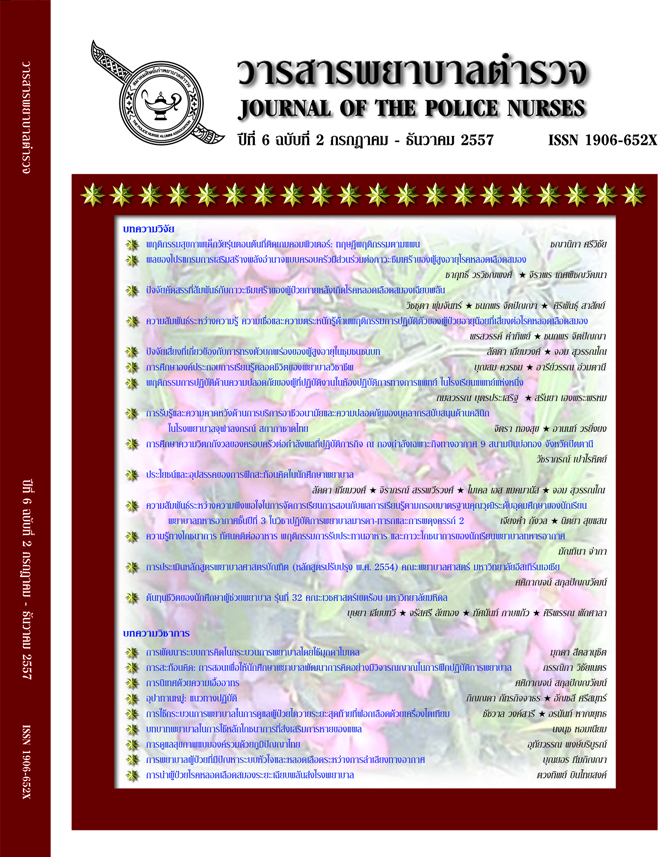ปัจจัยคัดสรรที่สัมพันธ์กับภาวะซึมเศร้าของผู้ป่วยภายหลังเกิดโรคหลอดเลือดสมองเฉียบพลัน
Keywords:
โรคหลอดเลือดสมอง, ภาวะซึมเศร้า, การสนับสนุนทางสังคม, การสื่อสาร, การรู้คิด, เผชิญปัญหา, Post acute stroke, Depression, Social support, Communication, Cognitive, CopingAbstract
บทคัดย่อ
การวิจัยครั้งนี้เป็นการวิจัยเชิงบรรยาย มีวัตถุประสงค์เพื่อศึกษาความสัมพันธ์ของปัจจัยคัดสรรที่สัมพันธ์กับภาวะซึมเศร้าของผู้ป่วยภายหลังเกิดโรคหลอดเลือดสมองเฉียบพลัน ได้แก่ การสนับสนุนทางสังคม ความสามารถในการปฏิบัติกิจวัตรประจำวัน ความสามารถในการสื่อสาร การทำหน้าที่ด้านการรู้คิด และกลวิธีการเผชิญปัญหา ตัวอย่างคือผู้ป่วยภายหลังเกิดโรคหลอดเลือดสมองเฉียบพลัน จำนวน 170 คน ที่ได้จากการสุ่มหลายขั้นตอน เครื่องมือที่ใช้ในการวิจัยประกอบด้วย แบบสอบถามข้อมูลส่วนบุคคล แบบประเมินการสนับสนุนทางสังคม ความสามารถในการปฏิบัติกิจวัตรประจำวัน ความสามารถในการสื่อสาร การทำหน้าที่ด้านการรู้คิด กลวิธีการเผชิญปัญหา และแบบประเมินภาวะสุขภาพ 9 ข้อ ผ่านการตรวจสอบความตรงตามเนื้อหาจากผู้ทรงคุณวุฒิ 4 คน และตรวจสอบความเที่ยงของแบบประเมิน ได้ค่าสัมประสิทธิ์แอลฟาของครอนบาคเท่ากับ .87, .84, .94, .71, .89 และ.90 ตามลำดับ วิเคราะห์ข้อมูลด้วยสถิติไคสแควร์และสถิติสหสัมพันธ์เพียร์สัน ผลการวิจัยสรุปได้ดังนี้
1. ผู้ป่วยภายหลังการเกิดโรคหลอดเลือดสมองเฉียบพลัน ร้อยละ 42.9 มีภาวะซึมเศร้าใน
ระดับเล็กน้อย (x = 5.37, SD=3.45)
2. การสนับสนุนทางสังคม ความสามารถในการปฏิบัติกิจวัตรประจำวัน ความสามารถในการสื่อสาร การทำหน้าที่ด้านการรู้คิด และกลวิธีการเผชิญปัญหามีความสัมพันธ์ทางลบกับภาวะซึมเศร้า (r= -.409, -.174, -.594, -.475 และ -.075 ตามลำดับ) อย่างมีนัยสำคัญทางสถิติที่ระดับ .05
Selected Factors Related to Depression in Post Acute Stroke Patients
Vitchuta Pumchan Chanokporn Jitpanya, Ph.D.
Captain Siriphan Sasat, Ph.D.
Abstract
The purpose of this study was to examine the relationships among factors related to depression in acute stroke patients including social support, activities daily living, communication, cognitive function and coping strategies. The participants were 170 outpatients with post acute stroke, using a multistage sampling methodology. Questionnaires were composed of demographic information, Social support, Activities of Daily Living, Communication ability, Cognitive function, Coping strategies and Patient Health Questionnaire-9 (PHQ 9). All were validated by four experts. The Cronbach’s alpha coefficients were .87, .84, .94, .71, .89 and .90, respectively. Descriptive statistics, Chi-square and Pearson’s product moment correlation were used for statistical analysis.
The major findings were presented as follows:
1. 42.9% of post acute stroke patients had mild depression (x = 5.37, SD=3.45).
2. Social support, Activities of Daily Living, Communication ability, Cognitive function and Coping strategies were significantly negative correlated with depression (r=-.409, -.174-.594, -.475 and -.075, respectively)
Downloads
Downloads
Published
How to Cite
Issue
Section
License
ผลงานที่ได้ตีพิมพ์แล้วจะเป็นลิขสิทธิ์ของวารสารพยาบาลตำรวจ















